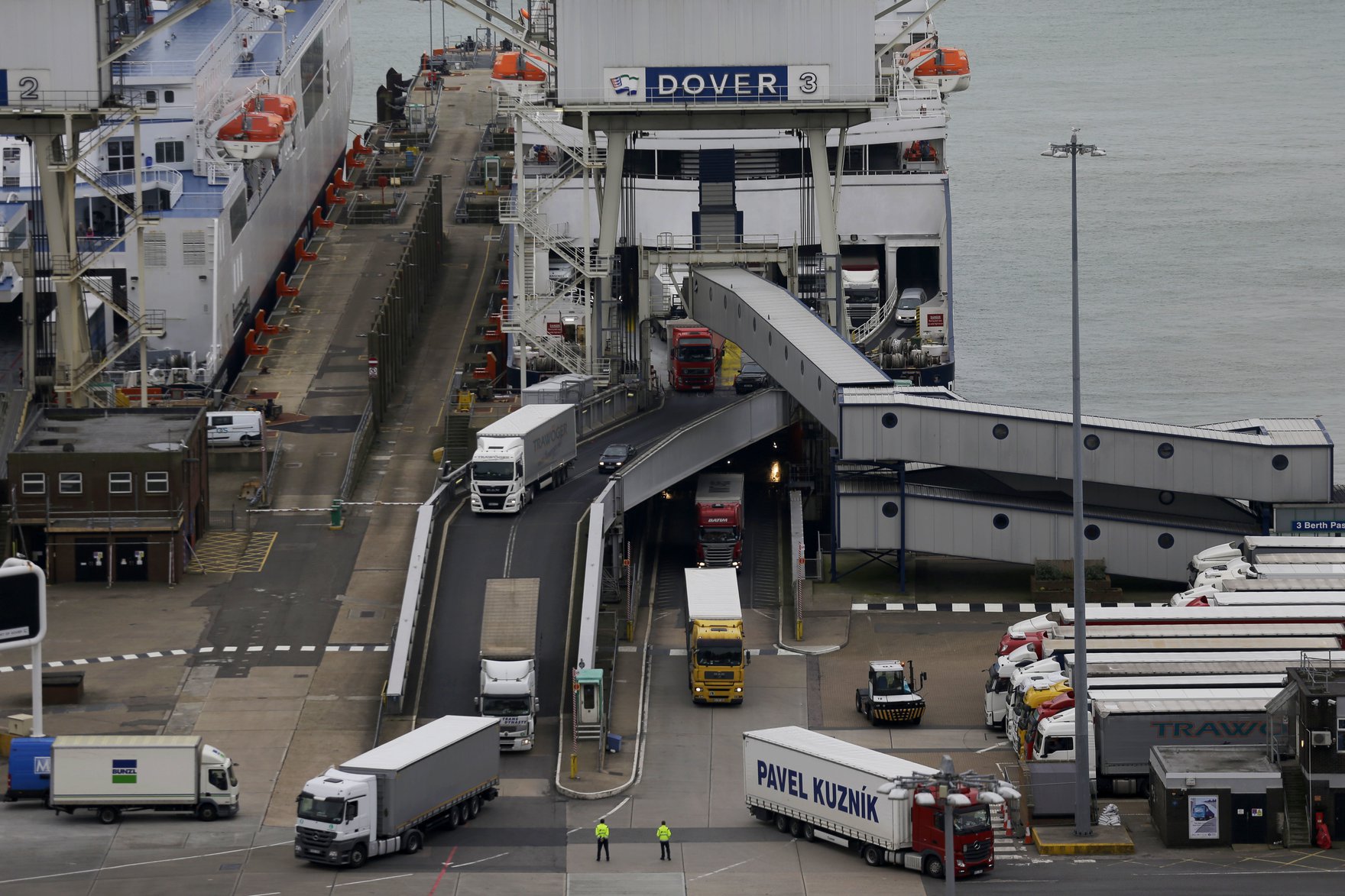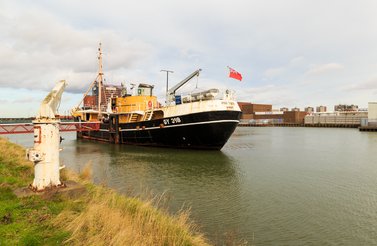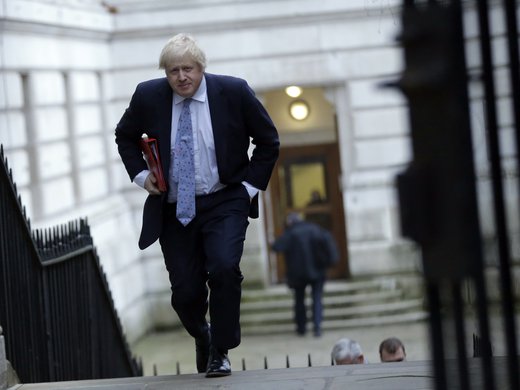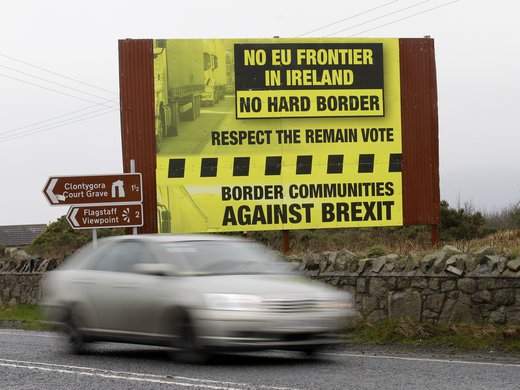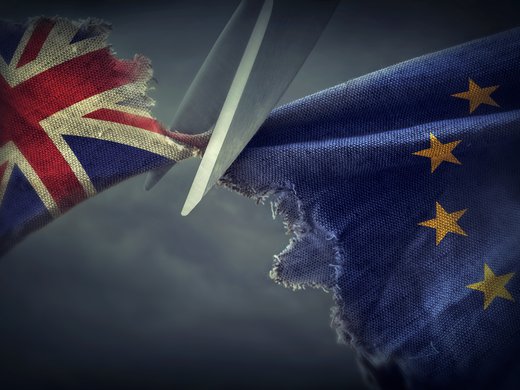Dover is Britain’s closest physical point to mainland Europe. The French city of Calais sits just 27 miles away, across the narrowest point of the English Channel. Dover is famous as the gateway to England, and its white cliffs feature prominently in song and literature as a symbolic guard. The cliffs are mentioned in Shakespeare’s King Lear, and in Matthew Arnold’s 1851 poem “Dover Beach”: “on the French coast the light / Gleams and is gone; the cliffs of England stand, / Glimmering and vast, out in the tranquil bay”.
In recent years, as Brexit has dominated British politics, the cliffs have been utilized in rather more prosaic ways. On March 29, 2017, the government triggered article 50 of the Treaty on European Union, beginning a legal process giving Britain exactly two years in which to negotiate the terms of its exit from the European Union. The same day, The Sun, a right-wing tabloid newspaper, projected a series of messages onto the cliffs, including “DOVER & OUT” and “SEE EU LATER.” The following month, the betting company Paddy Power erected a huge model of Prime Minister Theresa May on top of the cliffs. Clad in a Union Jack, this effigy was gesturing rudely, sticking her index and middle fingers up at the continent.
Dover’s significance to the United Kingdom is not merely symbolic. The town, situated in Britain’s southeastern corner in the county of Kent, is home to the busiest seaport in the country. What was once a barrier to the rest of Europe — and a prime objective in the invasion plans of William the Conqueror, Napoleon and Hitler — is now a central point of transfer. Each year, two million trucks pass through the town on their way to and from the port — on peak days, 10,000 freight vehicles might pass through. The goods carried in these trucks make up 17 percent of the United Kingdom’s total trade in goods, with a value of £122 billion per year. The vast majority — as much as 99 percent — of the freight moving through the port is intra-EU trade, meaning that it is not subject to customs checks. When Britain signed the Maastricht Treaty in 1992, virtually all checks on trade between Britain and the rest of the continent were eliminated. The single market harmonizes product standards across the European Union, and the customs union allows goods to move freely inside the bloc.
In January 2017, May announced that Britain would withdraw from both the single market and the customs union. But there has been no clarification of how it will deal with the practical ramifications.
“I don’t think goods will actually stop moving, but trying to predict the time it will take them to get into or out of the country at customs is going to be far more difficult to predict with additional border checks,” says James Hookham, deputy chief executive of Britain’s Freight Transport Association.
The potential implications are dizzying. For example, British food hygiene and electrical safety certificates that were once valid from Spain to Germany will not be accepted in the European Union. And British drivers and trucks will no longer have the automatic right to drive on French roads.
According to the timeline set out by article 50, on March 29, 2019, Britain will leave the European Union, with or without a deal. May has secured a 21-month transition period, but this only applies if a deal has been agreed upon. British trade is deeply entwined with the European Union, and in the event of no deal — which seems increasingly likely in the face of domestic parliamentary deadlock and disastrous talks with European leaders — the impact will be harsh across all sectors.
“At the moment, no deal is the only credible scenario we have to work on,” says Hookham. “All the possibilities that sit between — soft or hard Brexit, a Canada-style trade deal — are so vague and ill-defined that when it comes to trying to operationally plan movement of goods, it’s just impossible.”
The impact would be felt keenly in Dover, a town with a population of only 37,000. Researchers have estimated that adding a two-minute check for every lorry that passes through Dover would create a 17-mile traffic queue. In July, journalists obtained a copy of an impact report prepared by Dover City Council. The report warns: “The freight vehicles currently only take seconds to clear the port of Dover but if Brexit ends up creating regulatory and tariff barriers between the UK and the EU, it is predicted that there could be gridlock.” Raising concerns about a lack of clarity from central government, the report suggested that a 13-mile stretch of motorway “will be earmarked to hold heavy goods vehicles, in what will effectively become a giant temporary lorry park holding around 2,000 lorries.”
The response from central government has been blasé. In response to the traffic warning, the local member of Parliament for Dover and nearby Deal, Charlie Elphicke, an ardently pro-Brexit Conservative, said: “Our country, when is necessary, when our back’s against the wall, there’s nothing we can’t overcome.” During an appearance on the BBC in May, the transport secretary, Chris Grayling, insisted there would be no problem: “We will maintain a free-flowing border at Dover, we will not impose checks at the port, it is utterly unrealistic to do so. We don’t check lorries now, we’re not going to be checking lorries in the future.” Yet, there would be no clear legal basis for this to happen in the event of no deal, and as Hookham points out, there has been no public indication from the French authorities that they would take a similarly pragmatic approach in Calais. Unless they do, any attempt to wave vehicles through at Dover would be irrelevant, as trucks and ferries would be held up at the other side.
Tim Dixon is the general manager of Motis Freight Services Agency’s Dover operations and has worked in and around Dover’s port for 30 years. With a mandate from the UK Border Force, Dixon processes applications for customs clearance from lorry drivers taking freight into continental Europe. Currently, he and his team of 30 people focus on customs paperwork for lorries taking goods to and from non-EU countries such as Switzerland, Turkey and Ukraine. After Brexit, Motis could have the enormous task of checking details of foods in the thousands of lorries that travel between EU member states every day.
“The infrastructure at the port of Dover is very bad, given that we’re so busy. It isn’t set up for queues of vehicles into this bottleneck of the country. The port of Dover just wouldn’t allow us to come to a standstill,” he says. He echoes Grayling’s suggestion for a solution. “So what do you do? You let traffic move on and documentation would have to be arranged at a later date.”
Although Dover has been dependent on frictionless trade with the European Union for the last 25 years, the town does not have an easy relationship with Europe. In common with many other industrial towns in the United Kingdom, Dover economically declined throughout the 1980s. When Britain joined the single market in 1993, it meant major job losses in Dover, as jobs in customs checks were lost.
“When Romania and Bulgaria joined the EU not too long ago, the customs and freight agents lost more work, as we didn’t require customs clearance anymore,” says Dixon. “They’ve had to adapt to that, and now, it’s almost a role reversal.”
When the Channel Tunnel Rail Link between England and France opened in 1994, it stopped in Ashford, further down the Kent coastline. This meant reduced demand for ferry services from Dover, and more jobs lost. Two-thirds of Dover residents ultimately voted in favour of leaving the European Union in the 2016 referendum.
In summer 2015, a French ferry workers’ strike led to more than 7,000 trucks backed up along the motorway from Dover. Businesses across the United Kingdom lost more than £21 million of stock due to the delays, with perishable goods like shellfish and beef being dumped. An emergency traffic management strategy cost the Kent economy an estimated £1.5 million a day. That summer, Dover made national headlines, not just because of the traffic chaos, but because of the refugee crisis. Coverage of the encampment at Calais of migrants desperate to make their way across the Channel to Britain, ramped up. Images of people fleeing out of lorries in Dover were emblazoned across the front pages. The then prime minister, David Cameron, spoke about a “swarm of migrants” trying to enter the United Kingdom. In fact, the numbers did not reflect this: Britain is not even in the top five European countries in terms of asylum applications. But the optics were important. The Dover-Calais border was once seen as a key barrier against military invasion, and now it was depicted as invasion of another type. In January and April 2016, there were violent clashes after far-right groups marched in Dover, burning EU flags and chanting slogans such as “no more refugees.” They were met with counter-protests by anti-racist groups.
If Britain makes a withdrawal agreement with the European Union before March 29, 2019, a 21-month interim period will kick in, during which customs arrangements can be agreed. But as the March deadline rapidly approaches, time to agree on a deal is running out.
“For politicians to go on TV and further this belief that life will be normal and economic prospects will be unaffected by a no-deal outcome verges on negligent,” says Hookham. “I don’t see how the new requirements for supply chain logistics would allow normality to be the case. Perhaps in 10 years Britain will be fine, but certainly not in 10 months’ time.”
In areas like Dover that will be directly affected by sudden changes in customs arrangements, it is an urgent issue. “Government needs to clarify where we are with things,” says Dixon. “Certainly, local businesses and enterprises need to know how we’ll be affected.”
Yet, he remains cautiously optimistic. “I’ve been involved for quite a long time in Dover and [in] customs clearance and freight. We always find a way.”
